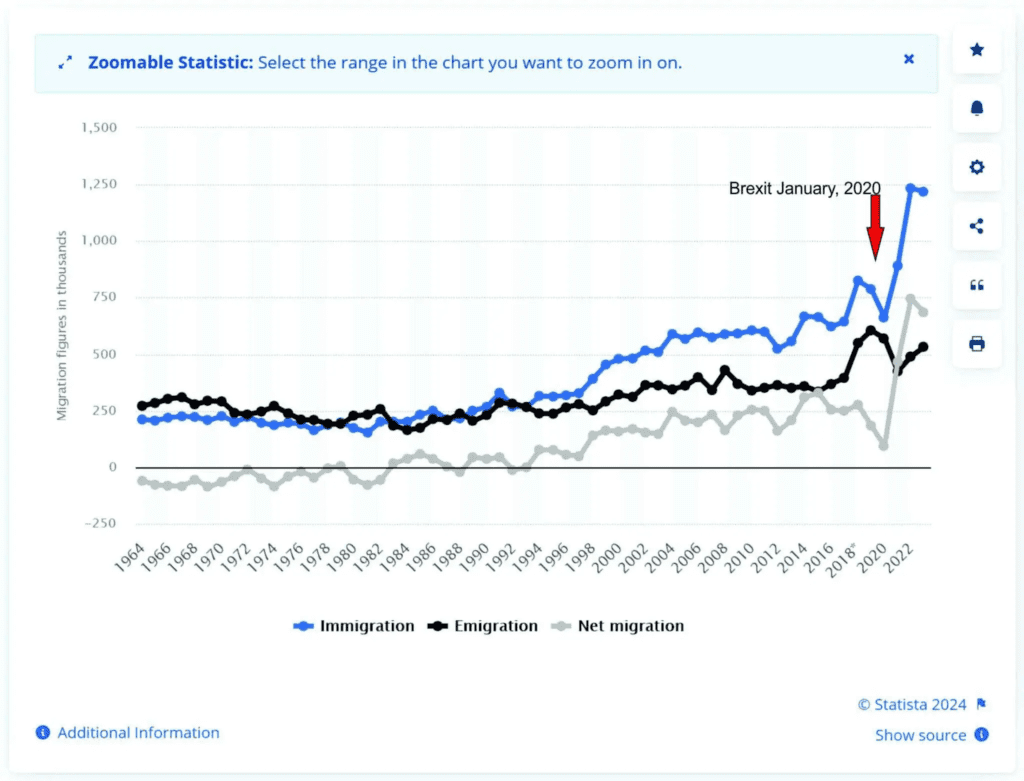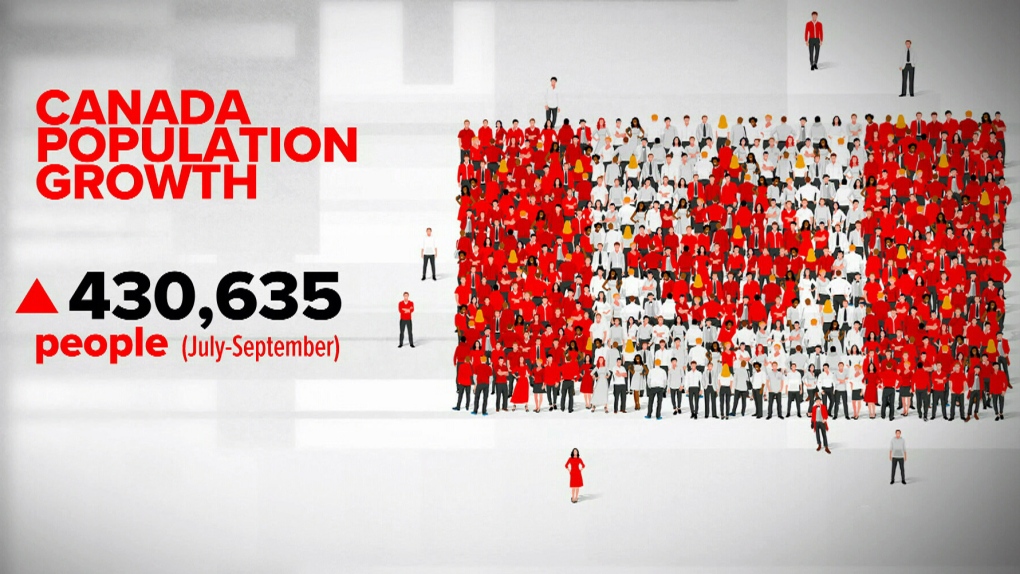Editor’s note: This article was originally published on the Canadians for a Sustainable Society website (sustainablesociety.com), which I encourage readers to check out. It is republished here, in a slightly abridged format, with permission of the author.
The cloak of invisibility is starting to fall off the elephant in the room. Some may think that Canadian government policy might have come to its senses when it “reduced” immigration levels. But the stabilization at still ridiculously high levels is not the product of new-found competency, rather it is a matter of political survival.
Canada is the only country in the West without an open discussion on immigration. This speaks to the power of the immigration lobby. However, the embargo is lifting in some surprising areas.
People’s Party of Canada has the most comprehensive policy on immigration as they present a specific goal: “The primary aim of Canada’s immigration policy should be to economically benefit Canadians and Canada as a whole.” This is clearly a radical fringe concept for immigration supporters.
The PPC goes on to make the following linkages:
- Immigration can’t solve ageing. (Ageing is both an opportunity and inevitable)
- Immigration has negatively affected productivity and wages.
- Canadians have been driven out of the labour market by immigrants.
- Immigration is expensive for governments and taxpayers.
- Immigration is the main cause of the housing crisis and the reason why young couples are unable to start families.
- Mass immigration undermines social cohesion.
If they had added in a host of negative environmental impacts and the crippling of our ability to become food and energy resilient in a depleting world, the PPC would have gotten perfect marks. But, let’s face it, the PPC is not focused on being that climate or environment friendly. At least not yet.
And now even a Liberal political leader, Zach Churchill of Nova Scotia, is challenging mindless growth: “…government services are bucking because of [Nova Scotia Premier] Tim Houston’s goal to double the population”.
Well Zach, say goodbye to any support from the CBC or the mainstream media, because they simply will not tolerate the linkage of immigration to any negative impacts. But it’s refreshing to see a political leader with both vision and backbone.
Backroom power
Despite the surfacing of public criticism, the immigration lobby of speculators, developers, and banks is hardly panicking. After all, their British counterparts managed to keep UK immigration levels at extreme highs after Brexit – despite mass immigration being the main factor driving the movement. The immigration lobby will continue to do just fine.


The swamp runs deep.
The political and media elite will keep up the inflationary pressure (aka “asset appreciation”, “the wealth effect”) on Canadian real estate prices and the accompanying debt levels. This should be a slam-dunk for them once the process hits the back rooms of government policy and the editorial rooms of the media corporations they control.
But still, there is dangerous talk making it into the mainstream conversation.
The Canadian Imperial Bank of Commerce – CIBC – started tracking job quality decades ago. This is a key well-being metric. Worse for the mass immigration lobby, the Bank of Montreal, in its “Fall Economic Statement – Modern Fiscal Reality” made some remarkably astute and responsible statements. Statements which relate economic metrics to citizen well-being as follows:
“In the job market, slack is building as job creation can’t keep up with labour supply growth. Consider that the 1.7 ppt increase in the unemployment rate since mid-2022 has been driven entirely by higher labour supply, while youth (15-24) unemployment surged above 14%. “
“These changes (immigration/temporary labour reductions) should gradually take some slack out of the job market through slower labour supply growth.”
“For housing, this move will dampen price pressures and rents, all else equal (e.g., rate cuts and mortgage rules). That said, the sudden shift in TR inflows should clearly soften the rental market just as a torrent of supply is coming online in some regions. We’ve long argued that Canada has a housing demand problem.” [i.e. from population growth]
This analysis links mass immigration to inflated housing costs, failing infrastructure and low productivity. Environmental activists have been making these links for decades. Until several years ago, suggesting these links on CBC and Globe and Mail forums has gotten comments “Content Disallowed”. Is the immigration lobby losing its grip on the national conversation or is it just bending to avoid breaking?
It is notable that the shift in power which has just taken place in the US was facilitated by the conversation being deliberately moved off corporate platforms, which fought change, onto less established (and less professional) more random and more open ones. Hence the corporate media and the interests they represent lost control of the conversation.
Political re-alignment
What happened in the communication space is likely to happen in the political space. Political parties willing to directly deal with the issues which have dragged Canada’s economy and quality of life down already exist.
The wide range of negative impacts mass immigration inflicts on Canadians and the land are right in the wheelhouses of the NDP and the Green Party. Social issues, worker welfare and environmental sustainability are the themes these parties were created to address.
But Canadian Green Party policy has devolved into a disjointed tangle of rights talking points rather than a cohesive strategy aimed at a clear goal of sustainability. Sadly, science and the Green Party parted company two decades ago. When did population and consumption cease to be of critical importance to Mother Nature?
Likewise, the NDP abandoned their base and raison d’etre by moving to a rights platform in a similar manner to American Democrats. They threw the structural issues of productivity, job quality, and equality under the bus for a media pleasing woke agenda. Where are Tommy Douglas and David Lewis when you need them?
Despite the lack of a designated and clear puck carrier, key structural issues are making their way into the national conversation. This is being picked up by astute politicians who have their ear to the ground rather than on the mainstream media newscasts. Airing of structural issues and their impacts on well-being could result in the national conversation regaining its relevancy, but this would likely need to happen outside of corporate media platforms. Is this too much to hope for? Are these points of light a trend or a blip?
Will Canada regain the path of prosperity and functional democracy, or will the mainstream media succeed in tightening the lid down even further on the open discussion of public opinion and interests?
If you know of any other challenges to growth made by public figures, please email us: info@sustainablesociety.com
All content on this website is copyrighted, and cannot be republished or reproduced without permission.
Share this article!




The truth does not fear investigation.
You can help support Dominion Review!
Dominion Review is entirely funded by readers. I am proud to publish hard-hitting columns and in-depth journalism with no paywall, no government grants, and no deference to political correctness and prevailing orthodoxies. If you appreciate this publication and want to help it grow and provide novel and dissenting perspectives to more Canadians, consider subscribing on Patreon for $5/month.
- Riley Donovan, editor